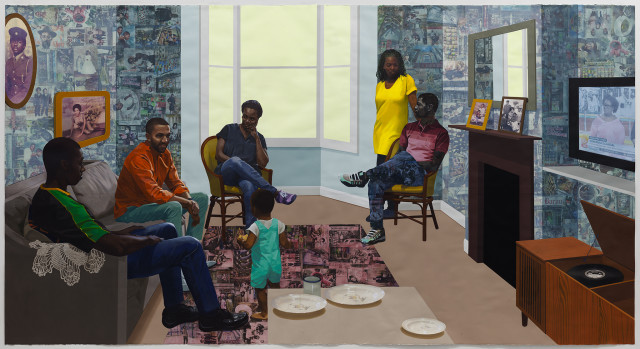
Njideka Akunyili Crosby
Remain, Thriving, 2018
Acrylic, transfers, coloured pencil, pastel and collage on paper
365.8 x 192.4 cm
144 x 75 3/4 in
144 x 75 3/4 in
One of the most distinctive voices of her generation, Njideka Akunyili Crosby (born 1983) draws on art historical, political and personal references to make luminous, densely layered figurative compositions whose intricate surfaces combine disparate materials and aesthetic traditions. An amalgam of processes including painting, drawing and photo-transfer techniques are harnessed in large-scale works on paper that, precise in style, nonetheless conjure the complexity of contemporary diasporic experience.
Completed in 2018, Remain, Thriving is the first work by the Los Angeles-based artist to address a specifically black British perspective. Its focus is Brixton in South London and the shared cultural memory that connects the past and present through an exploration of place. The work depicts an imagined domestic scene, a theme predominant in much of the artist’s work, of an informal gathering of grandchildren and great grandchildren of the Windrush generation in a fictional Brixton home. The space contains a number of vestiges of an earlier generation – for instance, an antimacassar on the arm of a sofa, a record player housed within a large wooden piece of furniture – which the figures may well have inherited from their parents or grandparents. A sense of a previous era might also be suggested by the transferred images in the background of Remain, Thriving, which on one level echo the heavily patterned wallpaper of homes of the past. In fact, these layered images convey the complex reflections on history, community and politics that have become synonymous with Akunyili Crosby’s art.
As with many of Akunyili Crosby’s most celebrated works, on initial impression Remain, Thriving appears to focus on an everyday scene and social gathering. It features figures in a scenario derived from familiar domestic experiences. Rather than meet the viewer’s gaze, they seem bound up in moments of intimacy or reflection that are left open to interpretation. It is, on one level, a snapshot of everyday life. However, ambiguities of narrative and gesture are underscored by a second wave of imagery, only truly discernible close-up: vibrantly patterned areas are created from images derived from history, politics and pop culture. Akunyili Crosby applies these to the surface of her work through an acetone transfer technique, sometimes in discrete areas, sometimes in more arrangements that seem to proliferate across the walls and floors of the rooms she describes and the clothing and even the skin of the figures contained within them. It is partly via this labour-intensive process that she addresses the idea of cultural overlap and the complex layering of influences – personal, cultural and political – on people and places. Here, ideas of home, hospitality and generosity mingle with thoughts about cultural inheritance in a broader sense.
In order to anchor this work in Brixton, and a British diasporic experience, Akunyili Crosby spent time in the area speaking to longstanding members of the local community as well as public historian Kelly Foster. The artist collated contemporary and archival images of Brixton. Locations such as the shop The Baron and Brixton Recreation Centre are visible in the work’s details, as are iconic people that have lived in Brixton, including the renowned Jamaica-born poet Linton Kwesi Johnson and activist and community leader Olive Morris. Many of the locations featured in the transfers have not survived the recent development of the area, indicating how this part of London has changed in the past decades.
Remain, Thriving is an image necessarily complicated in order to counter generalisations about African or diasporic experience. Describing her interiors as ‘wormholes’, Akunyili Crosby articulates the nuances of post-colonial identity and encourages leaps of time and space, across cultures and continents. It is in this respect that her work operates in the liminal, in-between zones that post-colonial theorist Homi K. Bhabha refers to as ‘the third space’, a point of overlap, conflation and mixing of cultural influence specific to diaspora communities.
In 2018, Remain, Thriving was reproduced to billboard scale and exhibited as the first work in a new programme of commissions at the entrance of Brixton Underground station. The project, which formed part of Art on the Underground’s 2018 programme of work by exclusively female artists, invited selected artists to take the numerous murals that were created in Brixton during the 1980s as an initial point of departure and to respond to their diverse narratives, the rapid development of the area and the wider social and political history of mural making.
Provenance
The artistExhibitions
Rock My Soul, curated by Isaac Julien, Victoria Miro, London, UK, October 2 - November 2, 2019
Reproduced for: Art on the Underground, Brixton Underground Station, Transport for London, London, UK, September 20 - April 8, 2019-2019